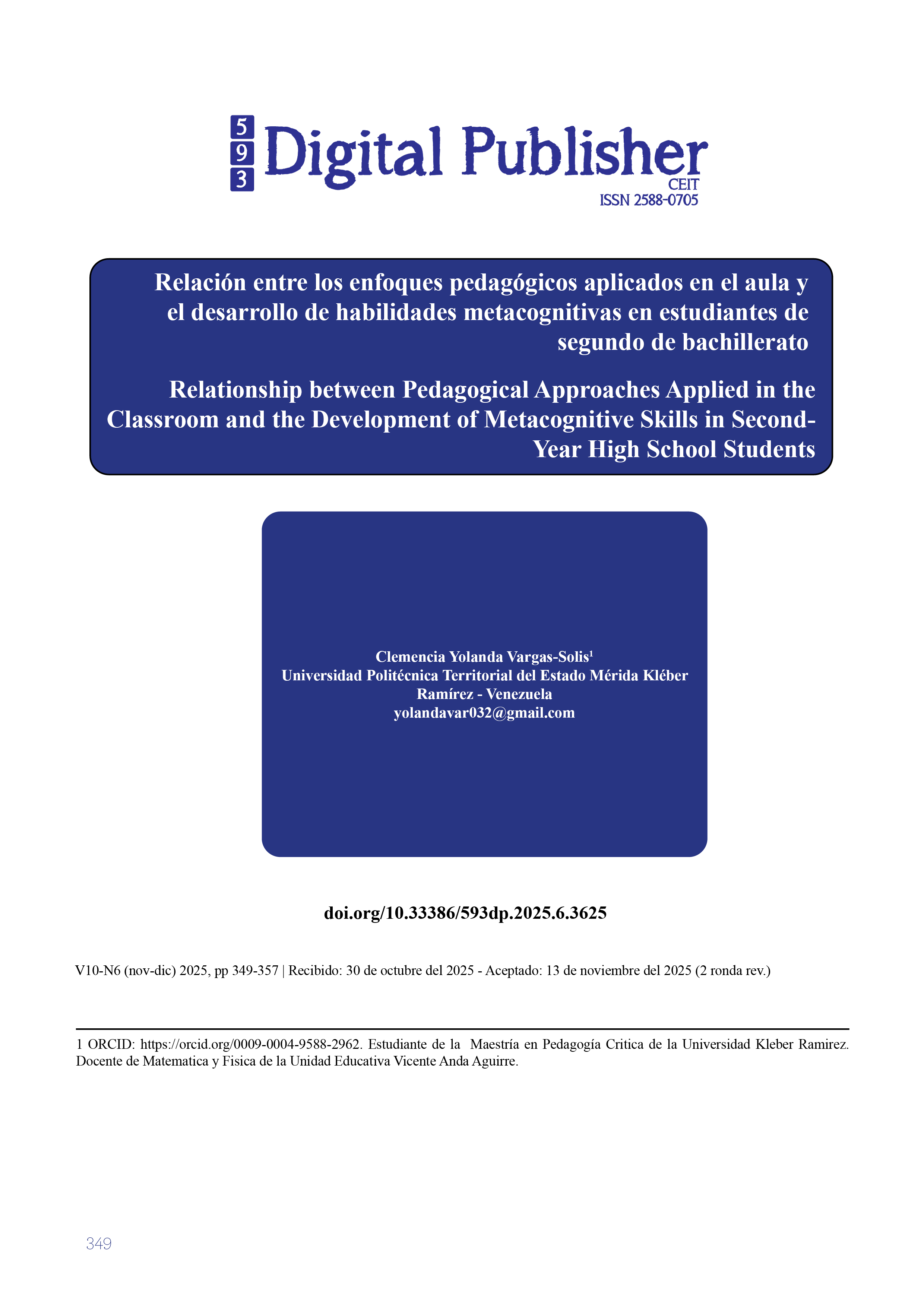Relationship between Pedagogical Approaches Applied in the Classroom and the Development of Metacognitive Skills in Second-Year High School Students
Main Article Content
Abstract
The study examines the relationship between pedagogical approaches applied in the classroom and the development of metacognitive skills in second-year high school students, aiming to strengthen autonomy, critical thinking, and self-regulated learning. A mixed-methods approach was used, combining qualitative and quantitative techniques under an action research and multiple case study design conducted in public schools in Guayaquil, Ecuador. Data were collected through classroom observations, interviews, questionnaires, and document analysis, ensuring validity through methodological triangulation. The findings revealed that the implementation of critical pedagogy-based strategies significantly improved students’ motivation, self-regulation, and academic performance. Teachers also reported enhanced reflective practice, despite persistent challenges related to limited time and technological resources. It is concluded that integrating critical pedagogy with metacognitive skill development fosters more inclusive, reflective, and transformative learning, and its incorporation into teacher training programs is strongly recommended.
Downloads
Article Details

This work is licensed under a Creative Commons Attribution-NonCommercial-ShareAlike 4.0 International License.
1. Derechos de autor
Las obras que se publican en 593 Digital Publisher CEIT están sujetas a los siguientes términos:
1.1. 593 Digital Publisher CEIT, conserva los derechos patrimoniales (copyright) de las obras publicadas, favorece y permite la reutilización de las mismas bajo la licencia Licencia Creative Commons 4.0 de Reconocimiento-NoComercial-CompartirIgual 4.0, por lo cual se pueden copiar, usar, difundir, transmitir y exponer públicamente, siempre que:
1.1.a. Se cite la autoría y fuente original de su publicación (revista, editorial, URL).
1.1.b. No se usen para fines comerciales u onerosos.
1.1.c. Se mencione la existencia y especificaciones de esta licencia de uso.
References
Aguerrondo, I. (2002). Los desafíos de la calidad educativa en América Latina. UNESCO.
Aguerrondo, I. (2002). Los desafíos de la política educativa relativos a las reformas de la formación docente. Documento de conferencia. https://es.scribd.com
Alquichire-Rojas, S., & Arrieta, F. (2018). Relación entre habilidades de pensamiento crítico y rendimiento académico. Voces y Silencios: Revista Latinoamericana de Educación, 9(1), 28–52. https://doi.org/10.18175/vys9.1.2018.28
Arias, F. (2012). El proyecto de investigación: Introducción a la metodología científica. Episteme.
Başar, S., & Öz, H. (2024). A review of critical pedagogy-informed collaborative professional development. Revista Interamericana de Psicología/Interamerican Journal of Psychology, 58(2), 163–179. https://doi.org/10.30849/ripijp.v58i2.1892
Ediyanto, W., Sulaiman, M., & Mirafuentes-Cruz, P. (2025). Triangulation in qualitative research: A comprehensive guide. Educational Research Review, 45, 100850. https://doi.org/10.1016/j.edurev.2025.100850
Facione, P. A. (2007). Critical thinking: What it is and why it counts. California Academic Press.
Facione, P. A. (2007). Pensamiento crítico: Qué es y por qué es importante. Insight Assessment. http://www.geocities.ws/jazstj/PensamientoCriticoFacione.pdf
Farrow, J. M., & Arikan, S. (2022). Exploring relationships between professional development and teachers’ enactment of project-based learning. Education Sciences, 12(4), 282. https://doi.org/10.3390/educsci12040282
Florián, L. E. (2014). El aprendizaje basado en problemas multidimensional como propuesta para el desarrollo del pensamiento crítico en los estudiantes de medicina de la Universidad Privada César Vallejo [Tesis de pregrado, Universidad César Vallejo].
Freire, P. (1996). Pedagogía del oprimido. Siglo XXI Editores.
Gimeno, J. (2008). El currículum: Una reflexión sobre la práctica. Morata.
Grant, P. D., Longhurst, J. M., & Thier, M. (2024). Rural definition triangulation: Improving the credibility and transferability of rural education research. Journal of Research in Rural Education, 40(1). https://doi.org/10.26209/JRRE4001
Johnson, R. B., Onwuegbuzie, A. J., & Turner, L. A. (2021). Mixed methods research: A research paradigm whose time has come. Educational Researcher, 50(3), 178–192. https://doi.org/10.3102/0013189X211020171
Katsantonis, I., & Koutsokostas, D. (2024). Exploring age-related differences in metacognitive self-regulation among school students. Frontiers in Psychology, 15, 1383118. https://doi.org/10.3389/fpsyg.2024.1383118
Lamsal, H. L. (2024). Critical pedagogy in addressing social inequality and promoting social justice in education. Advances, 5(3), 77–83. https://doi.org/10.11648/j.advances.20240503.12
Ministerio de Educación Nacional. (2016). Derechos básicos de aprendizaje. Gobierno de Colombia.
Morales Zúñiga, L. C. (2014). El pensamiento crítico en la teoría educativa contemporánea. Revista Actualidades Investigativas en Educación, 14(2). https://revistas.ucr.ac.cr/index.php/aie/article/view/14833
Olop, J., & Mädamürk, K. (2024). Students’ metacognitive knowledge of learning-strategy use in lower secondary school. Frontiers in Education, 9, 1307485. https://doi.org/10.3389/feduc.2024.1307485
Ortega, P. (2014). Pedagogía crítica en Colombia: Un estudio en la escuela de sectores. Universidad Pedagógica Nacional.
Ortega, P. (2016). Pensamiento crítico y rendimiento académico en los estudiantes del segundo semestre de la escuela profesional de Derecho de la Universidad Andina del Cusco [Tesis de maestría]. http://renati.sunedu.gob.pe/handle/sunedu/338030
Panthi, B. N. (2024). The critical in critical pedagogy: The interface between challenges and opportunities. Journal of Teacher Education and Curriculum Studies, 6(1), 45–59.
Pineda, J., & Cerrón, A. (2015). Pensamiento crítico y rendimiento académico de alumnos de la Facultad de Educación. Revista de Investigación Educativa, 33(2), 45–58.
Pineda, M., & Cerrón, A. (2015). Pensamiento crítico y rendimiento académico de estudiantes de la Facultad de Educación de la Universidad Nacional del Centro del Perú. Horizonte de la Ciencia, 5(8), 105–110. https://doi.org/10.26490/uncp.horizonteciencia
Prasse, D., & Narciss, S. (2024). Challenges in promoting self-regulated learning in digital environments: A review of reviews. Education and Information Technologies, 29, 12015–12042. https://doi.org/10.1007/s10639-024-11972-5
Qiao, L., & Zhang, H. (2024). Effects of multilevel metacognition on group performance in collaborative learning. Frontiers in Psychology, 15, 1419408. https://doi.org/10.3389/fpsyg.2024.1419408
Ramírez, R. (2008). La pedagogía crítica: Una manera ética de generar procesos educativos. Folios, 28, 108–119.
Reyes, J. M. (2012). Pensamiento crítico y rendimiento académico en contextos educativos rural y urbano [Tesis de maestría, Universidad de Manizales]. http://ridum.umanizales.edu.co:8080/xmlui/handle/6789/768
Sadykova, A., & Bazarbayeva, A. (2024). The impact of a metacognition-based course on school students’ metacognition and comprehension. Frontiers in Education, 9, 1460496. https://doi.org/10.3389/feduc.2024.1460496
Sánchez-García, R., & García-González, E. (2025). Enhancing project-based learning: A framework for equitable and critical classrooms. Sustainability, 17(11), 4978. https://doi.org/10.3390/su17114978
Stanton, J. D. (2021). Fostering metacognition to support student learning and performance. CBE—Life Sciences Education, 20(3), es6. https://doi.org/10.1187/cbe.20-12-0289
Villa, A., & Poblete, M. (2007). Aprendizaje basado en competencias: Una propuesta para la evaluación de competencias genéricas. Mensajero.
Yin, R. K. (2024). Case study research and applications: Design and methods (7th ed.). SAGE Publications.
Zapata, Y. P. (2010). La formación del pensamiento crítico: Entre Lipman y Vygotski [Tesis de licenciatura, Pontificia Universidad Javeriana].


